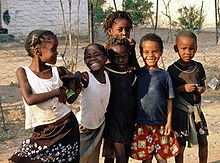Child


A child is most often defined as a young human being between birth and puberty; a boy or girl. The legal definition of "child" generally refers to a minor, otherwise known as a person younger than the age of majority. "Child" may also describe a relationship with a parent or authority figure, or signify group membership in a clan, tribe, or religion; it can also signify being strongly affected by a specific time, place, or circumstance, as in "a child of nature" or "a child of the Sixties."[1]
UN definition
The United Nations Convention on the Rights of the Child defines a child as "every human being below the age of 18 years unless under the law applicable to the child, majority is attained earlier".[2].
Biological definition
Biologically, a child is anyone in the developmental stage of childhood, between infancy and adulthood.
Attitudes toward children
Social attitudes toward children differ around the world, and these attitudes have changed over time. One study has found that children in the United States are coddled and overprotected.[3] A 1988 study on European attitudes toward the centrality of children found that Italy was more child-centric and Holland less child-centric, with other countries (Austria, Great Britain, Ireland, and West Germany) falling in between.[4]
Age of responsibility
The age at which children are considered responsible for their own actions has also changed over time, and this is reflected in the way they are treated in courts of law. In Roman times, children were regarded as not culpable for crimes, a position later adopted by the Church. In the nineteenth century, children younger than seven years old were believed incapable of crime. Children from the age of seven were considered responsible for their actions. Hence, they could face criminal charges, be sent to adult prisons, and be punished like adults by whipping, branding or hanging. [5]
See also
References
- ^ "American Heritage Dictionary". 2007-12-07.
- ^ "Convention on the Rights of the Child". Office of the United Nations High Commissioner for Human Rights. Ratified by 192 of 194 member countries.
- ^ Child-centered America
- ^ Rachel K. Jones and April Brayfield, Life's greatest joy?: European attitudes toward the centrality of children. Social Forces, Vol. 75, No. 4, Jun 1997. 1,239-69 pp. Chapel Hill, North Carolina.
- ^ Juvenile courts
External links
- CDC's "Learn the Signs. Act Early.” campaign Information for parents on early childhood development and developmental disabilities
Template:Articles of the Universal Declaration of Human Rights
